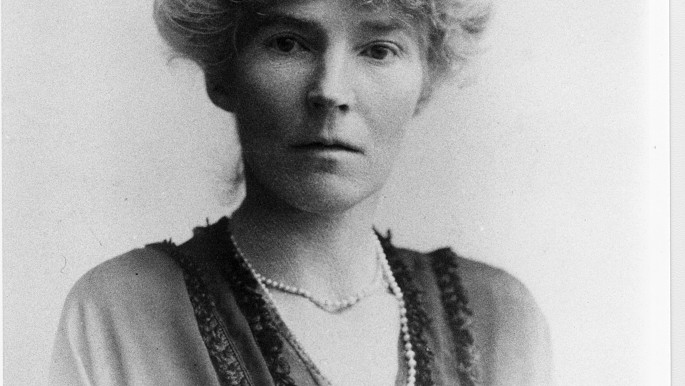New Iraq documentary chronicles Gertrude Bell's desert storm
A Middle East defined by colonial European powers a century ago is in tatters.
British-drawn borders intended to promote nationalism and ideas of political statehood have given way to rival beliefs, tribes and ethnicities, ruled by despotic regimes.
No territories have been more volatile than Iraq's. With oil, history and religious ties, power struggles have not ceased.
One such struggle is being played out in Mosul right now, as Baghdad battles to deny the Islamic State group its coveted caliphate.
And as Iraq throws itself into its national project, a film about its creation has never been more relevant.
Directed by Zeva Oelbaum and Sabine Krayenbuhl, Letters from Baghdad tells the story of Gertrude Bell, archaeologist, Arabist, and explorer. She was described as the female Lawrence of Arabia, yet she remains little known or rightly acknowledged as the most powerful woman in the British Empire in her day.
Despite Bell's historic imprint on modern day Iraq - she was instrumental in drawing Iraq's borders and installing King Faisal I - she was "systematically written out of the history of the period".
"An adviser gave us a really wonderful way to think about it," Zeva told The New Arab.
"Going out into the desert in this region was a test of British masculinity. Once Gertrude Bell did it, it wasn't so much fun anymore because a woman could do it - the men weren't able to puff themselves up."
"We thought it was one thing that they don't know her in the US - but in the UK they should know her," Sabine added.
"We asked random people on the train, in restaurants. We were having lunch where she grew up and people had no idea."
Fascinated by Bell's story as the mediator between British powers and the Arabs, Zeva and Sabine spent four years reading a cache of letters Bell exchanged between family and colleagues as well as memoirs, memoranda and intelligence files to piece together the journey of the woman who became affectionately known as khatun - meaning fine lady or gentlewoman - by Iraqis.
The pair also delved into archives, unearthing never-before-seen footage of 1920s Baghdad.
"We always knew we wanted to bring this period alive," Sabine said.
"Archive footage can sometimes look really bad, so it was important for us to go back to the negatives and transfer them digitally so they looked pristine, as good as they could, and now they're available for other filmmakers to use - that was a side mission and initiative that we did as part of the project."
She added: "The footage was a big undertaking. We didn't know whether we would find anything from that time, because it was the beginning of cinema. There are very few archives in the Middle East.
"Everything that's been in the news, people forget or don't even know what it was like [in Iraq]. It occurred to us as we started to screen it, we had a lot of wonderful responses from Iraqis and they feel emotional about it."
Voiced by Academy Award-winning actress Tilda Swinton, the film chronicles Bell's explorations of the Middle East, which culminated in joining then War Secretary Winston Churchill at the 1921 Cairo Conference, where - as the only woman among the delegates - she patched Iraq together out of Shia, Sunni and Kurdish territories.
After Faisal appointed her Director of Antiquities, Bell established the National Museum of Iraq in Baghdad.
But it was Bell's role in shaping Iraq and the chilling parallels with the 2003 American invasion - in 1916 she wrote: "We rushed into the business with our usual disregard for a comprehensive political scheme" - which makes her, and the film, so pertinent today.
"What's always so astonishing to us is that it repeats itself," Sabine said. "In 2003, could they [the Americans] have not done it differently? Why did they have to do it in the exact same way? That's where the mind boggles."
Bell's Iraq lasted 47 years, before the Ba'ath party seized power in 1968.
But she was more than a colonial officer; she was a true Arabist who was devoted to her adopted country. In Iraq, you'll still hear references to Miss Bell, and her grave in Baghdad is looked after to this day.
Letters from Baghdad is screened at the UK's Cambridge Film Festival on October 23 and 24.
![Gertrude Bell [Gertrude Bell archives, Newcastle University] Gertrude Bell [Gertrude Bell archives, Newcastle University]](/sites/default/files/styles/image_345x195/public/media/images/AF20A00A-307E-4F53-B650-39945C873F5E.jpg?h=d1cb525d&itok=EFTkLcNh)

![President Pezeshkian has denounced Israel's attacks on Lebanon [Getty]](/sites/default/files/styles/image_684x385/public/2173482924.jpeg?h=a5f2f23a&itok=q3evVtko)



 Follow the Middle East's top stories in English at The New Arab on Google News
Follow the Middle East's top stories in English at The New Arab on Google News


